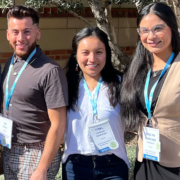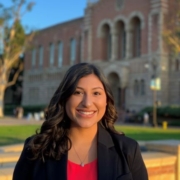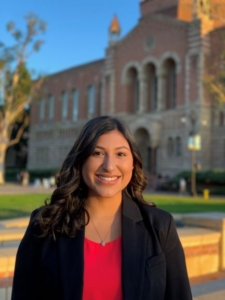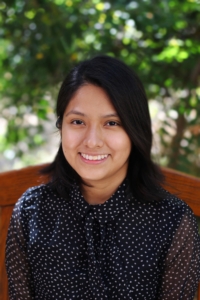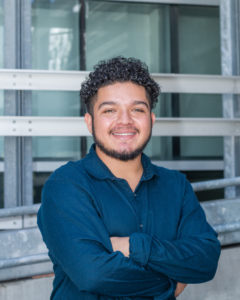Authors: Heidy Melchor (LPPI Policy Fellow, B.A. 2023) & Arianah Rizzo (LPPI Policy Fellows, B.A. 2024)
One key goal of UCLA’s Latino Politics and Policy Institute is to encourage and provide opportunities for Policy Fellows to participate in paid professional development activities to develop the next generation of policy leaders. UCLA LPPI exposes student leaders to policy experts and academic and career resources to build skills that accelerate their trajectories.
During the 2022-2023 Fellowship year, UCLA LPPI sent undergraduate and graduate fellows to multiple conferences and events, including the Asian American and Pacific Islander (AAPI) Policy Summit, Hispanas Organized for Political Equality Latina Action Day and the Mexican American Bar Association (MABA) gala, among others. Through these experiences, fellows engaged with policymakers and other key stakeholders, developing the skills to become powerful advocates in their own right. Additionally, fellows heard from subject area experts and learned new skills through UCLA LPPI programming, like Policy Diálogos and skills workshops, to continue to empower them to advocate around the most critical issues in Latino communities. With these experiences and the network gained through UCLA LPPI, fellows become equipped with the tools they need to take action on issues in new spaces and roles as they continue their careers.
Our Fellows in Action programming demonstrates the power of coupling skill-building and hands-on research with advocacy and mobilization experiences.
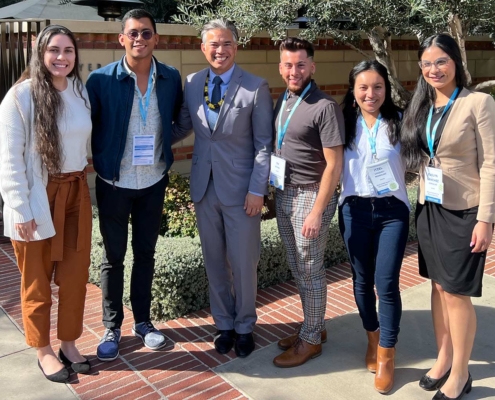
Itzel Vasquez-Rodriguez (second from right)
A prime example is Itzel Vasquez-Rodriguez, a graduate policy fellow in UCLA LPPI’s Mobilization Department and a current public policy masters student in the UCLA Luskin School of Public Affairs. Itzel became involved in the Students for Fair Admissions (SFFA) v. Harvard Supreme Court Case. She was one of a handful of students selected to join an amicus brief submitted to the Court. Reflecting on what drew her to participate in this action, Itzel shared, “I became involved in this case back because I believe banning the consideration of race for colleges and universities in the United States limits quality educational opportunities and training for the next generation of leaders, and creates further systemic barriers for BIPOC students.” Itzel also noted the case’s significance and impact, saying, “Affirmative action has opened up many doors for highly talented BIPOC students who, unfortunately, may otherwise be overlooked for admission.”
Itzel sees LPPI as giving her even more opportunities to strengthen her network by introducing her to other students and staff “who care about equity and justice for BIPOC communities at UCLA and beyond.”
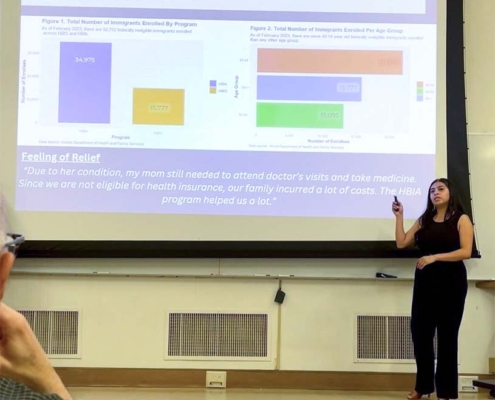
Rocio Perez presenting
Another of our returning research fellows, Rocio Perez, a Master of Public Policy student at the UCLA Luskin School of Public Affairs, has also felt the impact of the firsthand experience UCLA LPPI provides. Rocio is involved with Health Illinois, where she analyzes enrollment data and conducts stakeholder interviews to determine the health impact of two Medicaid expansion programs. Through this experience, Rocio secured sponsorship to attend a national conference as a participant and panelist, where she spoke on the importance of humanizing data and her previous work on hunger and poverty.
Her fellowship at UCLA LPPI provided the skills to further her advocacy and work on novel research projects like the Latino Data Hub (LDH). Working on the LDH project has provided critical exposure to working with data sets and strengthened her quantitative and writing skills. In reflecting on her experience, Rocio credits her current success to the mentorship she received from UCLA LPPI, “I would not be where I am today without Dr. Rodrigo Dominguez-Villegas [Director of Research] and Sonja Diaz [Founding Executive Director of UCLA LPPI] who believed in and offered me the fellowship, or without the mentorship I received from Jie Zong [Senior Research Analyst] and Misael Galdámez [Research Analyst] to work towards my career goals.”
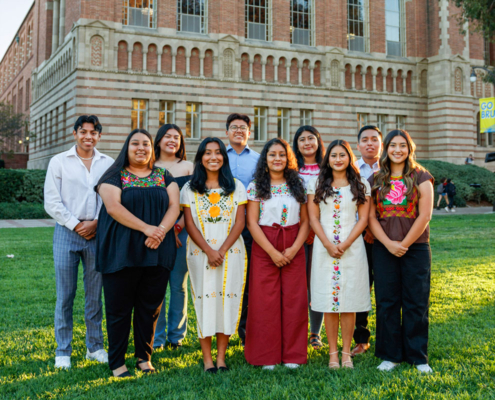
Heidy Melchor w Grupo Estudianti Oaxaqueño (GEO) de UCLA
Heidy Melchor, an undergraduate policy fellow in the Programs Department, is also putting her fellowship to work. While at UCLA LPPI, she founded Grupo Estudiantil Oaxaqueño (GEO) de UCLA, a student-led organization on campus created to bring together the growing community of Oaxaqueños on UCLA’s campus. The student group provides a safe space to share and discuss cultures with one another while offering academic support. Utilizing UCLA LPPI’s network of faculty experts, Heidy connected with Elizabeth Gonzalez, the inaugural Hispanic-Serving Institution (HSI) director in the Chancellor’s Office at UCLA. Building on GEO’s work to connect Oaxacan students with faculty who share similar identities, Heidy organized a community event for students to personally meet with Dr. Gonzalez and learn about her trajectory in higher education.
Heidy expressed her gratitude for having a space like UCLA LPPI and the phenomenal mentors it has connected her too. She noted how their care for her and her passions have pushed her even further and given her the building blocks to grow into the future leader she hopes to become. Heidy said, “LPPI has allowed me to learn and gain confidence in professional spaces. I am eternally grateful for this experience that has built my confidence in professional settings.”
Mirian A. Palacios Cruz is another undergraduate fellow in the UCLA LPPI’s Communications Department, who recently published her political science departmental honors thesis, “Tu Luchá es Mi Luchá” (Your Fight is My Fight): Transgender Visibility and Latinx Solidarity.” This remarkable research centers the lives of transgender Latinx immigrants, setting it apart from many traditional research spaces. Mirian shared why her work is so critical, “Investigating the political attitudes of the Latinx community through a gender-responsive framework will not only allow us to raise awareness about the issues impacting cisgender women and LGBTQ Latinxs but also improve our understanding of the factors that influence the political mobilization of this community to inform political engagement campaigns.” Mirian expressed gratitude for the mentorship and support of her faculty mentor and UCLA LPPI expert, Dr. Efrén Pérez.
UCLA LPPI believes in investing in Latine scholars to develop the leaders of tomorrow. The policy fellows at UCLA LPPI continue to overachieve and show passion in every project they are involved with. As graduating policy fellows move on to the next step in their careers, we’re excited to highlight the next steps in their journeys.
Rocio Perez accepted a summer position with the Georgetown Center on Poverty and Inequality, focusing on economic security issues. Heidy Melchor will be taking her next steps in her career in Washington, D.C. as a public policy fellow with the Congressional Hispanic Caucus Institute. And Mirian Palacios Cruz will continue working with Women’s March Action. Her long-term goal is to pursue a Ph.D. in history or political science.
We applaud the Class of 2023, and thank them for their efforts and contribution to the success of UCLA LPPI. With leaders like these four young women, the future of Latine policy and leadership looks bright.

